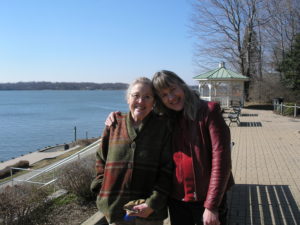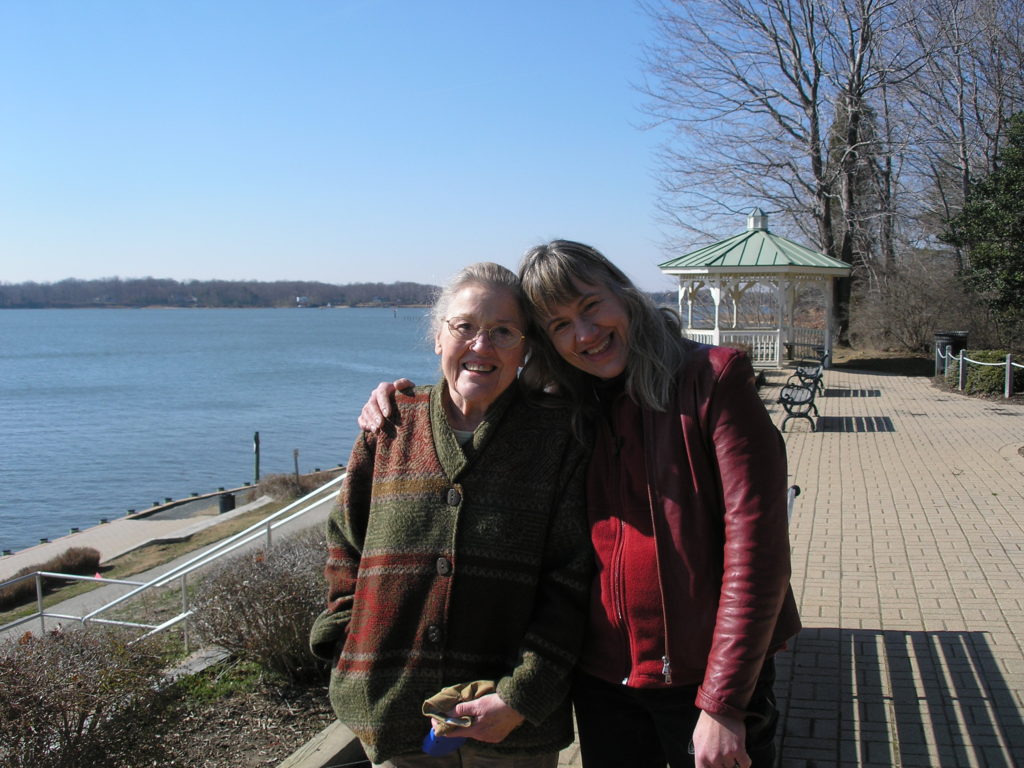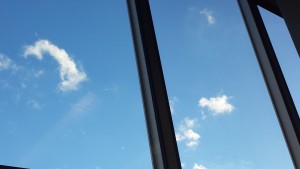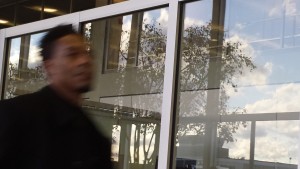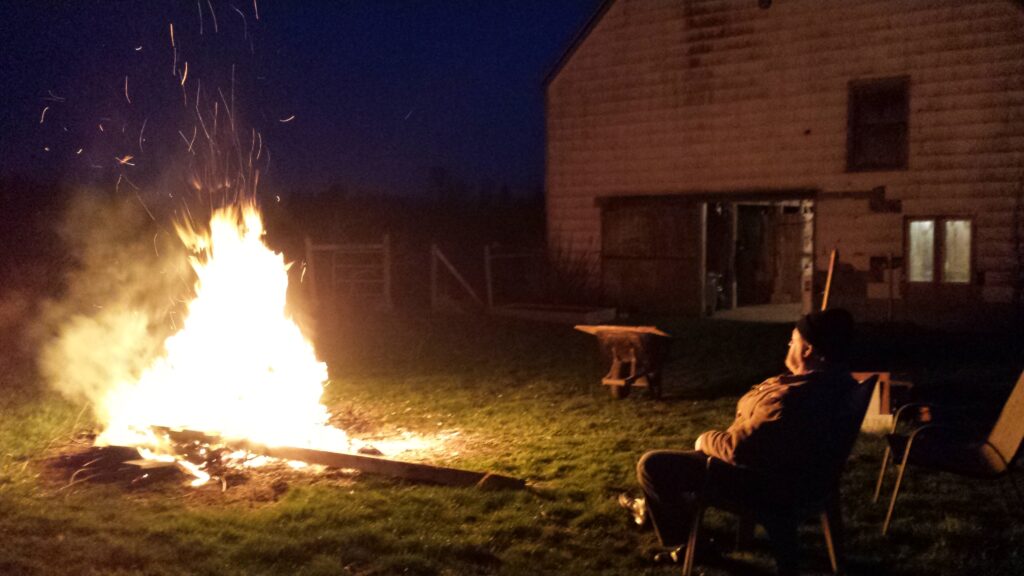She wheeled the wire shopping cart piled high with belongings further to the side of the road, a smile on her face. She was happier than she’d been in days. Earlier in the day she’d found a black plastic dust pan with a long handle–what she’d heard them call a lobby dust pan the time she’d had a Motel 6 cleaning job–behind a house near the back alley. It didn’t look beat enough to throw away. Maybe someone from the house had just used it to clean up around the trash and then forgotten it, but there it was, by the trash can. A throw away for sure. Now it was stuck, handle down, pan up, in the corner of her cart and she was smiling. She had plans. They were great plans. She had a purpose. She arranged her belongings again in the cart, shifting the blanket around a bit on top. It was a nice clean blanket, almost white. She smiled more sweetly to herself. I don’t have to go back to that place tonight. Too much noise. Too many people in my business.
After a while she thought she’d get busy. The friendly girl was talking again, but it was just pleasant jabber. She could keep it in the background if she got going. The Nasty Man hadn’t put in a word for the last couple of days since she’d left the downtown shelter. She’d found a nice place across from the dump, sheltered and flat, surrounded by trees. No one else was there now, although there was a bit of trash and a torn, wet ragged shirt on the edge of the cleared spot. Other people came there for sure but for tonight it was probably hers, private, her own.
She crossed the busy road to the side where cars and shiny pick-up trucks pulled in the road to the recycle. There was lots of debris by the side of the road, stuff that fell off loads, blown bits from the last wind storm. She took out the stubby old broom she’d found a week ago in the dumpster and pulled out the new treasure. She stopped to admire it for a minute. Black. Solid. The hinge at the bottom of the handle let the pan swing down just right. Looking down at the gutter, she thought my, it’s dirty. Really needs attention. She began sweeping things up into the pan. There was a nice song in her head. Seemed like the Other Woman was singing in the background. She hummed a bit, sweeping. Cars went by.
Soon the pan was getting full and she started to think where she’d dump it. She looked around for a trash can, a dumpster. Nothing out front of the industrial buildings on this side. She stood the lobby pan on the asphalt next to the grass, making sure to move the handle so it balanced, just so. Look how nice it just stands there, waiting for me, so polite. She rummaged in her cart. There it is. My garbage bag. She pushed down the crumpled chips bag and the mushy remnants of the buns from the food bank. Opening out the top of the bag carefully, she made room for the wider opening among her other belongings in the cart. She picked up the dust pan and tipped it carefully into the bag, the way they’d taught her at The Agency before she got that motel job. The chunks of trash and the dust slid nicely into the bag. She made sure the cart was propped safely on the grass within reach, taking her time. The song was nice now. Slow, the voice mellow. The Uncle Guy started to shout at her once when she was sliding the dirt into the bag, but she told him, loud, “No! It’s not like that,” and he shut up. She picked up the pan and the broom she’d propped against a tree by the road and kept up her work.
A couple of times she got so absorbed in making sure she got the bits of bark that had blown onto the asphalt that cars honked at her, thinking she was walking into their path. She’d look up and see the driver shaking his head. Once the driver shook a finger and looked like she was saying something nasty. Once a woman in the passenger side waved her hand through the open window and smiled at her. A guy riding by on his bike, racy helmet, orange tight shirt, gave her a thumb’s up and shouted “Good work!” as he zipped by.
The Uncle Guy was starting to criticize her work. “That’s stupid! Why’re you doing that! Who cares! You’re worthless anyway. Never make a dime.” She kept shaking her head and muttering things under her breath back at him, but he wouldn’t stop. The friendly girl had gone away and the singing had stopped. Every once in a while there was a hissing voice, maybe coming from under the bush near the trees. Something watching her? She was starting to feel the old sense of dread in her gut. Time for a break.
She took her lobby pan and the broom and went to sit down in the shade on a big rock. She muttered at The Uncle some more and then decided she was hungry. Her stomach was rumbling gently. She thought about what was in her cart and remembered the loaf of white bread and a bit of cheese left over from her trip to the food bank a couple of days back. Getting off the rock carefully, still holding her tools, she went to poke through the cart. She found the bread, squished but not yet moldy, the cheese in an old plastic bread bag, just a little wet since she’d put a half-eaten apple in with it. She tossed the apple that was now brown and bruised and brought the bread and cheese back to the rock, the bags in one hand and the tools awkward in the other, dragging.
She sat for a while and ate some bread and the rest of the cheese. It was pretty quiet. Not too many cars. A bit breezy, but not cold. The zippered sweat shirt she’d found was enough to keep her warm in the shade. The fir trees towering around her were dark but they felt strong, protective. The crows that had been hopping around on the fir needles under the big trees by the road now came hopping nearer to her, cawing. She threw a bit of bread and two big ones converged on it, squawking, wings beating, beaks parted at each other. They both flew off a few feet, cawing. The smaller one came back to the bread while the bigger one jumped up to a branch and preened. She watched for a long moment while other crows came and went, noisily. Soon her interest wandered, her mind blank. She thought about the black lobby pan. It was still there, propped next to her against the rock. I’d better get back to it. The Uncle Guy crankily told her she might as well give it up, she was so useless. She decided to ignore him. Someone had taught her that not too long ago, a case worker. You could just ignore him sometimes. It was hard, but if she got busy it might work.
With her lobby pan and broom, she went back to her cart and checked to make sure everything was still there on the top as she’d left them. I’d better close up this bag a bit, she thought, ‘cause of those crows. They’ll just hop on up here and start pecking around. She looked around on the side of the road. Yup, still a lot of mess. She rolled the lobby pan behind her, the smile returning, the broom in the other hand, and moved out towards a pile of bark and debris on the edge of the asphalt.
A car honked loudly, startling her badly so she jumped back and dropped the handle of the lobby pan with a clatter. The car–she saw it was an old red one, new paint, maybe a Buick–went up to the next drive, pulled in and backed up quickly, coming back on the other side of the road. The driver was rolling down his window, hard, she could see. As he pulled up across from her he shouted at her out the window, “You fuckin’ crazy woman! I could have fuckin’ killed you! I could have killed you and then where’d I be? In fuckin’ jail, you crack head! Jail! Fuck you!!” He jerked up his window as he floored it, engine sounding like a race car, back to the turn-off to the dump where he squealed in, gravel popping and then backed out fast, driving towards her again. She watched, frozen. as he passed, close, stretching his arm out over the passenger seat with his middle finger emphatically extended. She could just barely hear the “Fuck you!” through the closed window.
She shook her head, arms loose at her sides, tears starting in her eyes, her chest burning. The Uncle Guy was yelling at her. “See! You’re fuckin’ stupid! You need to just kill yourself. Hang yourself on a tree. It’s easy. Just do it! You need to do it. You know you do!” Her head reeled. She sat down where she was on the grass and then yelled “Fuck you, too!” as another car passed, a girl in the passenger seat looking briefly at her and then away, as if there had been nothing there. Yelling had made the tears stop. She crooned to herself for a moment. Oooh. Ooooh. Aaah. She remembered suddenly she hadn’t taken her noon med. She still had a few they’d gotten for her at the shelter. The small ones. She got off the ground, feeling a little stiff, picked up her tools and went over to her cart. Moving aside the garbage bag, she found the box under her blanket. It’s Thursday she thought. Yeah, and opened the one marked Th. She rummaged around some more and found the half bottle of water she’d saved and downed the pill. I’d better get back to work, she thought. Yeah. There’s lots to do. She smiled as she picked up the lobby pan and the broom, pleased at how nicely that hinge let the pan swing down as she lifted the handle to carry it back to the next pile. “Maybe I can get that cleaned up before it starts getting cold. She’d like that. She would.”





